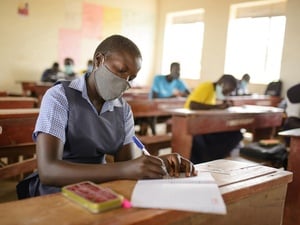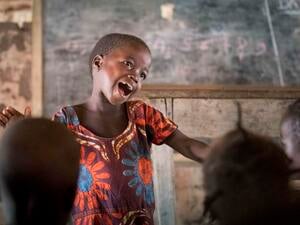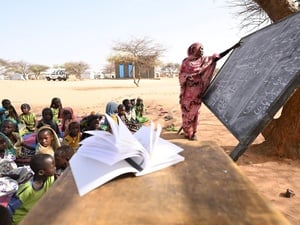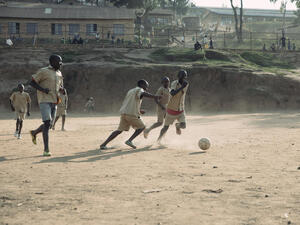Palestinian refugee children die in Iraq
Palestinian refugee children die in Iraq
Two sick Palestinian refugee children waiting for resettlement from Iraq died in the last two weeks, one of them in Al Waleed refugee camp at the Iraq-Syria border and the other one in Baghdad. Another refugee, a 50-year-old man, also waiting to be resettled, died earlier this month in Al Waleed refugee camp. So far seven people have died there, including three young children, since Palestinian refugees started to arrive at the border in March 2006 fleeing violent attacks against them.
A 3-year-old Palestinian boy died a few days ago in Ramadi hospital and was buried in Al Waleed, where the family had been living since fleeing Baghdad in September last year. He had been suffering from rickets, a bone disease caused by lack of vitamins and minerals. He also suffered from pneumonia. Another Palestinian child whose resettlement approval was pending, a 14-year-old suffering from Hodgkin's disease, died in Baghdad last week.
The UN refugee agency has spoken on various occasions about the serious difficulties faced by Palestinian refugees in Iraq, many of whom are stranded at the border, unable to cross into the Syrian Arab Republic. Earlier this year, we appealed for specific support and urgent medical resettlement for vulnerable and sick children in Al Waleed camp, as specialised medical treatment is difficult to find in Iraq.
So far, UNHCR has helped resettle one family of eight with several sick children from this camp to Norway last August. Another 11 medical cases submitted for resettlement are awaiting approval. Meanwhile, UNHCR has continued to identify other Palestinian medical cases, such as cancer patients and children with birth defects, who need urgent care. UNHCR continues to urge resettlement countries to make rapid decisions and facilitate the departure of those most in need.
An estimated 2,000 Palestinians are living in desperate conditions in refugee camps along the Iraq-Syria border, unable to cross into Syria, a country already straining to cope with hundreds of thousands of Iraqi and Palestinian refugees. A steady flow of Palestinians have fled Baghdad since March 2006, when intimidation, forced evictions and attacks against their community began mounting. UNHCR has sought solutions for the whole group since last year and has only received positive indications from Sudan and Chile. Earlier this year Brazil took 107 Palestinians who had been stuck in Jordan's Ruweished camp for four years.
Meanwhile, some refugees continue to return to Iraq. UNHCR staff in Syria noted an average of 600 Iraqis returning to their country daily over the past week. Many of them said that they had run out of money and their visas had expired. On Tuesday an Iraqi government-organised convoy brought home an estimated 800 Iraqis, in a journey which took some 45 hours. We have not yet had a chance to talk to these returnees.
We welcome any improvements in the security situation and stand ready to assist people who have decided or will decide to return voluntarily. Iraqis themselves are the best judges as to how secure they feel. However, we still do not believe that the time has come to promote, organize or encourage returns to Iraq. That would be possible only when proper conditions are in place - including material and legal support and physical safety.
According to government estimates, there are some 2.2 million Iraqi refugees - including some 500,000 in Jordan and up to 1.5 million in Syria. An estimated 2.4 million are displaced inside Iraq.









